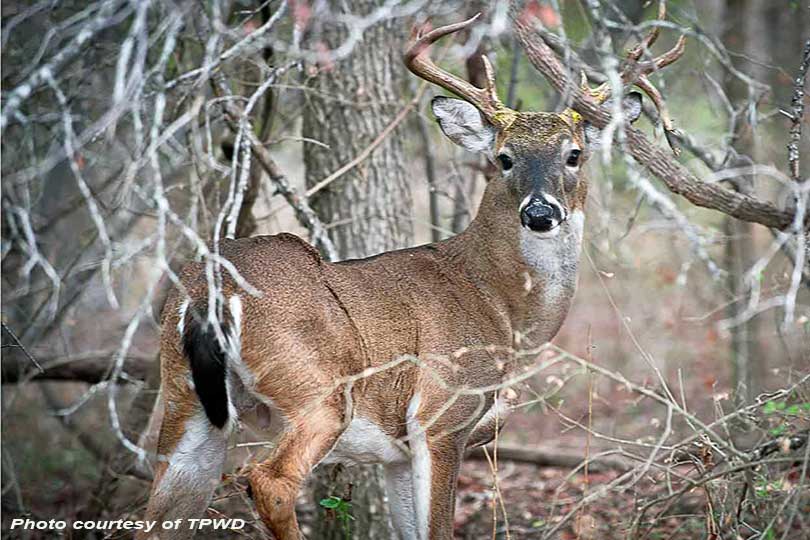By Shala Watson
Staff Writer
Deer season is off to a good start in Texas. The deer habitat is in good shape and wildlife is flourishing. Abundant rainfall has soaked the soil and led to good forage growth. There has been plenty available for deer to eat, which bolsters antler growth.
But deer hunters in the Lone Star State need to be aware of new carcass movement restrictions and mandatory requirements for Chronic Wasting Disease (CWD) testing of harvested deer for the 2016-2017 hunting season. Hunters can play a prominent role in bringing it under control.
CWD is a fatal neurological disease in some deer species such as mule deer, white-tailed deer and elk.
CWD is believed to be transmitted through prions, which accumulate in the brain, spinal cord, eyes, spleen and lymph nodes of infected animals. A total of 35 CWD-positive deer has been discovered in Texas to date, 26 of those from white-tailed deer in captive deer breeding facilities and nine from free-ranging mule deer.
The Texas Parks and Wildlife (TPW) Commission adopted new CWD Management Rules this summer. The rules are intended to reduce the chances of CWD spreading and to detect and contain CWD in areas where it might be present.
A new carcass movement restrictions rule mandates no deer or elk carcasses or parts of carcasses can enter Texas from a state or country known to have CWD.
The primary sources of infection for deer are from animal-to-animal contact and a contaminated environment by infected animals shedding prions through bodily fluids and from decomposition of an infected animal.
The Texas Parks and Wildlife Department (TPWD) and the Texas Animal Health Commission (TAHC) have developed a sound CWD management program to reduce the severity of implications resulting from the disease.
CWD check stations have been set up in the Panhandle and Trans-Pecos to collect samples from hunter-harvested deer and elk. All deer harvested in the Panhandle and Trans-Pecos CWD zones must be reported to TPWD check stations within 24 hours of harvest.
“If you’re a hunter in the Trans-Pecos or that part of the Panhandle where we have these CWD zones established, you need to bring your deer by the check station to get it checked before it leaves the zone so our biologists can pull the CWD samples,” Allen Cane, white-tailed deer program leader, said in an interview with the Texas Farm Bureau Radio Network.
There are three check stations in the Trans-Pecos region that will be open during the entire general mule deer season from Nov. 25 to Dec. 11. The check stations are located near Cornudas, Van Horn and the Pine Springs area, Cane noted.
There are two check stations in the Panhandle CWD zone located in Dalhart and Vega.
Hunters leaving a CWD zone in the Trans-Pecos and Panhandle with their harvested animal must quarter the deer or elk and remove the head from the carcass two to three vertebrae below the head.
Hunters who harvest a deer or elk in the Medina County CWD Zone are recommended to have their animal sampled within 24 hours of harvest, but it is not required.
CWD was detected in deer breeding facilities in Medina County last year and heightened testing has resulted in additional discoveries.
“In Medina County, it’s voluntary sampling, but we are encouraging hunters to bring as many samples as they can because we need to do some very intensive surveillance out there to determine whether CWD is in the free-ranging deer population,” Cane said.
The Medina County area check stations are located in Hondo and Tarpley.
A list of collection sites and times is available online at www.tpwd.texas.gov/cwd. In addition to those established collection locations, biologists will also be conducting localized sampling at various sites throughout the season to meet sampling objectives.
Waivers can be obtained for hunters wanting to take an intact deer head to a taxidermist outside the Trans-Pecos or Panhandle CWD Zones. These waivers can be obtained at a CWD check station or online.
Hunters should also report any sick looking deer or elk while hunting in any CWD Zone to TPWD.

